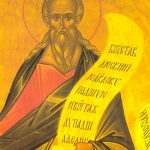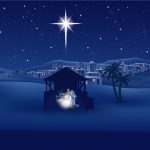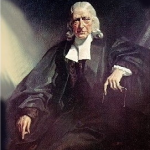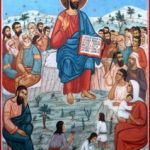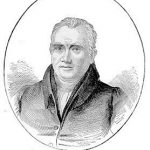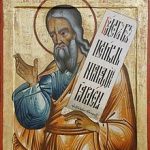The Anointed Preacher – Isaiah 61:1–4
 We are told in the Gospel of Luke 4:16-19 that when Jesus had opportunity to speak to the synagogue in Nazareth, he read from the scroll the words of Isaiah 61:1-2 and announced: “Today this scripture has been fulfilled in your hearing.” (Luke 4:21). These verses in Isaiah described Jesus’ mission in life.
We are told in the Gospel of Luke 4:16-19 that when Jesus had opportunity to speak to the synagogue in Nazareth, he read from the scroll the words of Isaiah 61:1-2 and announced: “Today this scripture has been fulfilled in your hearing.” (Luke 4:21). These verses in Isaiah described Jesus’ mission in life.
These ancient words speak to us today of the vocation of the preacher — then and now. When we first come to these verses in the prophecy of Isaiah (or Third Isaiah or whatever his name was) we immediately wonder: who is the prophet talking about? Is this the writer’s mission or is he speaking of someone else? Questions like this might not arise if it weren’t for the fact that the prophecies of the book of Isaiah can be quite mysterious that way. Who is the suffering servant of Isaiah 53? Who is the “servant” of Isaiah 42:1? Who is the figure spoken of in Isaiah 11:2? Who is speaking in Isaiah 48:16? You see what I’m saying.
 It seems to me that the prophet is speaking of himself. This is his understanding of his mission to his generation. but, I wouldn’t limit it to that. This was also the mission taken up and extended by Jesus. Because of the account in the Gospel of Luke, the early Christians saw this passage as a reference to the Messiah. And, given the mysteriousness of much of the book of Isaiah, this is not without precedent. I wouldn’t doubt that passages like this were understood to be Messianic by the Jewish teachers of Jesus day. They read in the Psalms of a king greater than any king that they had ever historically had — and they looked ahead to a promised king. So, here this is easily seen to be a Messianic figure — the ultimate prophet of hope. And, this is the way Christians look at it too. We see in Jesus the ultimate king and prophet and mediator — prophet, priest and king.
It seems to me that the prophet is speaking of himself. This is his understanding of his mission to his generation. but, I wouldn’t limit it to that. This was also the mission taken up and extended by Jesus. Because of the account in the Gospel of Luke, the early Christians saw this passage as a reference to the Messiah. And, given the mysteriousness of much of the book of Isaiah, this is not without precedent. I wouldn’t doubt that passages like this were understood to be Messianic by the Jewish teachers of Jesus day. They read in the Psalms of a king greater than any king that they had ever historically had — and they looked ahead to a promised king. So, here this is easily seen to be a Messianic figure — the ultimate prophet of hope. And, this is the way Christians look at it too. We see in Jesus the ultimate king and prophet and mediator — prophet, priest and king.
But, beyond that, it seems to me that these verses also typify the vocation of a prophet — that is to say, a preacher. What is the role of the person who goes forth to bring good news to others? I think this passage can prove helpful to Christian preachers in understanding their own vocation.
The Revised Common Lectionary, assigns two sections of Isaiah 61 to the third Sunday of Advent this year: verses 1-4 where the prophet talks about his own mission and calling, and verses 8-11 where the character and salvation of God are proclaimed.
Isaiah 61:1-4:
“The spirit of the Lord GOD is upon me, because the LORD has anointed me; he has sent me to bring good news to the oppressed, to bind up the brokenhearted, to proclaim liberty to the captives, and release to the prisoners;
רוּחַ אֲדֹנָי יְהוִה עָלָי יַעַן מָשַׁח יְהוָה אֹתִי לְבַשֵּׂר עֲנָוִים שְׁלָחַנִי לַחֲבֹשׁ לְנִשְׁבְּרֵי־לֵב לִקְרֹא לִשְׁבוּיִם דְּרוֹר וְלַאֲסוּרִים פְּקַח־קוֹחַ
“to proclaim the year of the LORD’S favor, and the day of vengeance of our God; to comfort all who mourn;
לִקְרֹא שְׁנַת־רָצוֹן לַיהוָה וְיוֹם נָקָם לֵאלֹהֵינוּ לְנַחֵם כָּל־אֲבֵלִים
“to provide for those who mourn in Zion — to give them a garland instead of ashes, the oil of gladness instead of mourning, the mantle of praise instead of a faint spirit. They will be called oaks of righteousness, the planting of the LORD, to display his glory.
לָשׂוּם לַאֲבֵלֵי צִיּוֹן לָתֵת לָהֶם פְּאֵר תַּחַת אֵפֶר שֶׁמֶן שָׂשׂוֹן תַּחַת אֵבֶל מַעֲטֵה תְהִלָּה תַּחַת רוּחַ כֵּהָה וְקֹרָא לָהֶם אֵילֵי הַצֶּדֶק מַטַּע יְהוָה לְהִתְפָּאֵר
“They shall build up the ancient ruins, they shall raise up the former devastations; they shall repair the ruined cities, the devastations of many generations.”
וּבָנוּ חָרְבוֹת עוֹלָם שֹׁמְמוֹת רִאשֹׁנִים יְקוֹמֵמוּ וְחִדְּשׁוּ עָרֵי חֹרֶב שֹׁמְמוֹת דּוֹר וָדוֹר
The early Christian commentators saw this as statement of the Trinity, and you can see why: here is the Spirit, the Messiah and the Lord God. This was not part of the prophet’s theology in his day, but we can see how it foreshadows the roles of Father, Son, and Spirit as they are pictured in the New Testament.
 The prophet is inspired by the Spirit of God. There is a redundancy here as the divine name YHWH (יְהוִה) is repeated: “the spirit of the Lord GOD (אֲדֹנָי יְהוִה) is upon me, because the LORD (יְהוִה) has anointed me…” It is God’s Spirit that inspires, it is God that commissions. There is a divinely inspired prophet with a divinely inspired commission. Remember, prophet basically means preacher. It’s too bad so many see the word “prophet” as meaning someone who predicts things. The prophets were the people who came with God’s message for their generation. They were preachers.
The prophet is inspired by the Spirit of God. There is a redundancy here as the divine name YHWH (יְהוִה) is repeated: “the spirit of the Lord GOD (אֲדֹנָי יְהוִה) is upon me, because the LORD (יְהוִה) has anointed me…” It is God’s Spirit that inspires, it is God that commissions. There is a divinely inspired prophet with a divinely inspired commission. Remember, prophet basically means preacher. It’s too bad so many see the word “prophet” as meaning someone who predicts things. The prophets were the people who came with God’s message for their generation. They were preachers.
The Gospel story began with preachers. This is what we are told in Matthew, Mark, Luke and John. First there was john the Baptist proclaiming a message of repentance of the forgiveness of sins. Then came Jesus — who traveled among this villages of Judea with this message: “The time is fulfilled, and the kingdom of God has come near; repent, and believe in the good news.” (Mark 1:15). It began with preachers. Someone had a word — which enabled others to envision a new reality for themselves and for their times.
And here we come upon another reason why this passage could be seen as a reference to the Messiah. The root word appears here. The word for “anointed” is מָשַׁח (mashach) — and the Messiah (from the same root word) is “the anointed one.” Generally speaking, it was the Kings of Israel and Judah who were anointed with oil, as a commissioning for their role. In the Old Testament the only prophet who was spoken of as being anointed was Elisha in 1 Kings 19:16. So, anointing signifies authority. The prophet (that is, the preacher) is on a royal mission from God to proclaim good news. The kingly and prophetic roles are combined.
The preacher’s role is to bring good news to those who most need it: “to the oppressed, to … the brokenhearted, to … the captives, and … to the prisoners….” Adam Clarke saw in this an allusion to the Old Testament concept of the Year of Jubilee.
The proclaiming of perfect liberty to the bound, and the year of acceptance with JEHOVAH. is a manifest allusion to the proclaiming of the year of jubilee by sound of trumpet. See Lev. 25:9, &c. This was a year of general release of debts and obligations, of bondmen and bondwomen, of lands and possessions which had been sold from the families and tribes to which they belonged. Our savior, by applying this text to himself, (Luke 4:18, 19,) a text so manifestly relating to the institution above mentioned, plainly declares the typical design of that institution.
But, the point is that the message came to those most in need of a message of hope: those who could not help themselves. So, this message of hope — a message with with which Jesus aligned himself — is directed toward: the oppressed and marginalized, the poor, the needy, the emotionally crushed, the prisoners. The setting for all this is the captivity of Judah in Babylon — Jerusalem is in ruins. It is a message of hope to the hopeless. It is good news to the poor. It is not for the comfortable and secure — it is for those in need. As has often been said, the preacher’s role is to comfort the afflicted and to afflict the comfortable. The message of God always arouses us in our complacency and encourages us in our despair. Hope in ourselves and earthly things is false hope. We need to be roused from it. Only when we despair of all else, do we find lasting hope in God.
The proclamation of hope is combined, however, with a message of judgement: “and the day of vengeance of our God.” Readers of the New Testament are reminded of the book of Revelation — a message of hope for the oppressed and faithful that includes a message of judgement against the oppressors and the faithless. It is interesting to not that Jesus is reported to have left this part of the prophecy out when he quoted this as the basis of his mission. Jesus did not come to bring condemnation, but hope. This was not because some condemnation was not appropriate — we get angry ourselves when reading the news, we wonder why those who have done evil cannot be more quickly stopped — but because hope forgiveness, and restoration were more needed. With God, judgement is always a last resort. Lifting up the oppressed will mean bringing down the oppressor.
Rather than being shamed and brought low, the nation will be exalted: “They will be called oaks of righteousness, the planting of the LORD, to display his glory.” Rather than “ashes” they will receive “a garland.”
The prophet tells them that the story of the nation is not over: “They shall build up the ancient ruins, they shall raise up the former devastations; they shall repair the ruined cities, the devastations of many generations.”
What are the implications of such prophecies for preachers today? It is a good question to ask, since preachers today take on the ancient role of the prophet: to speak God’s will for their generation. Living encounter with the ancient word of God brings forth a new word. For this, preachers need the inspiration of the Spirit. The Spirit of God who inspired the prophets, who inspired the early apostles must fall anew, inspire anew. The Spirit always inspires a message of hope to the hopeless, a message of encouragement to those who most need it.
Preachers extend the ministry of the Messiah Jesus into our present day.


